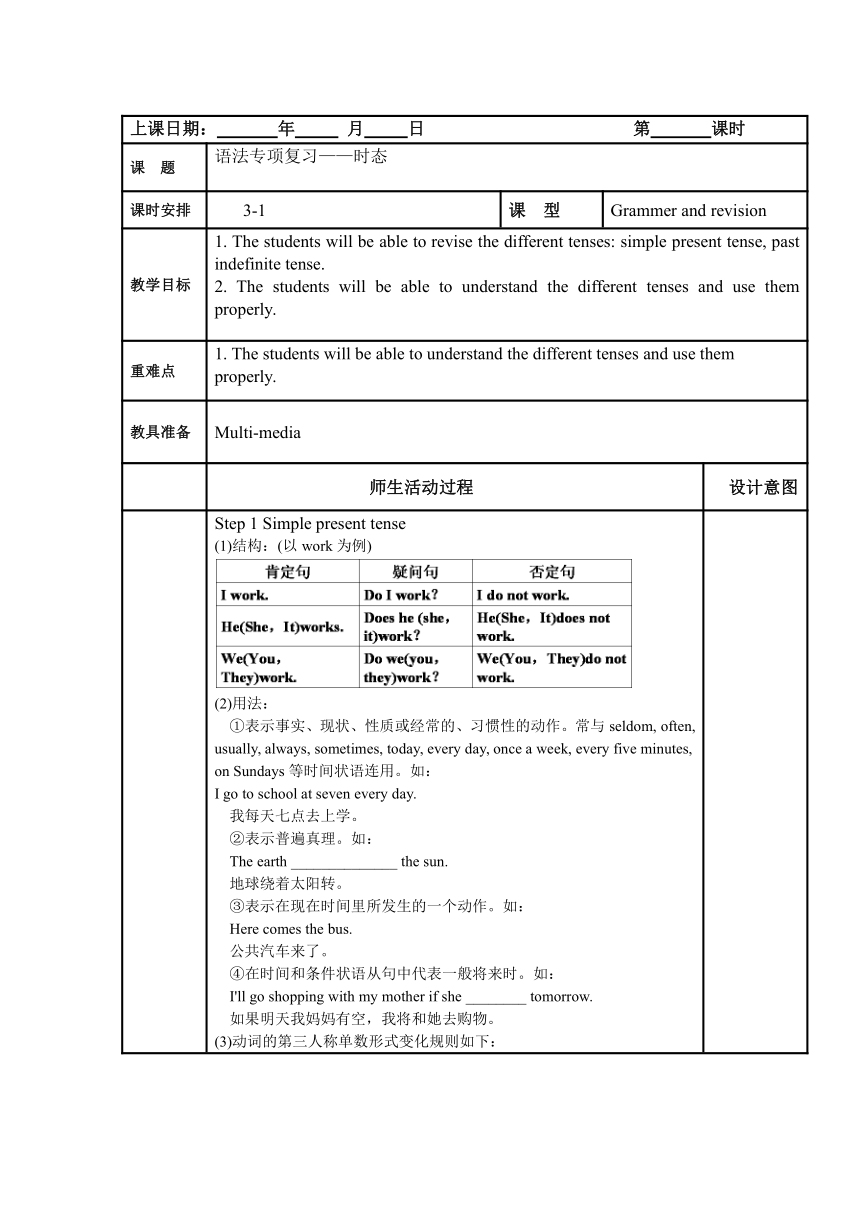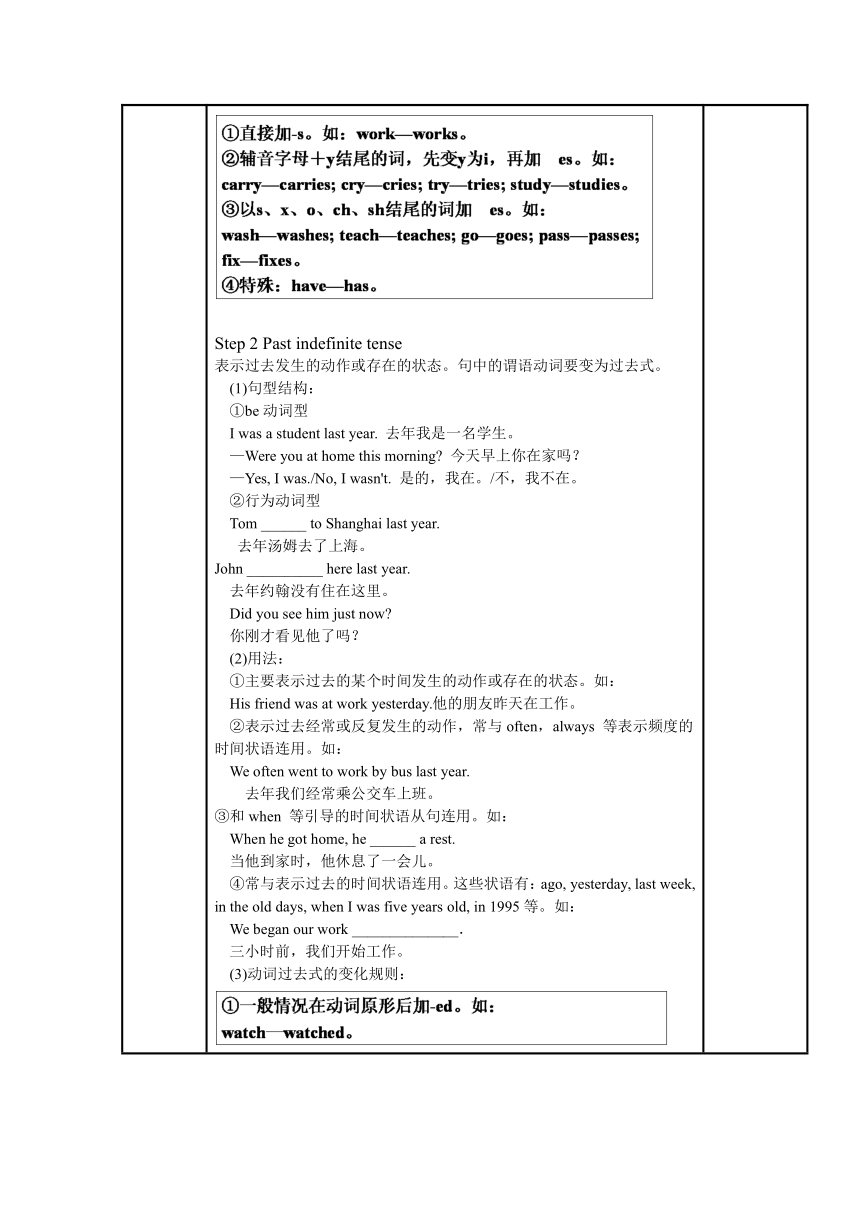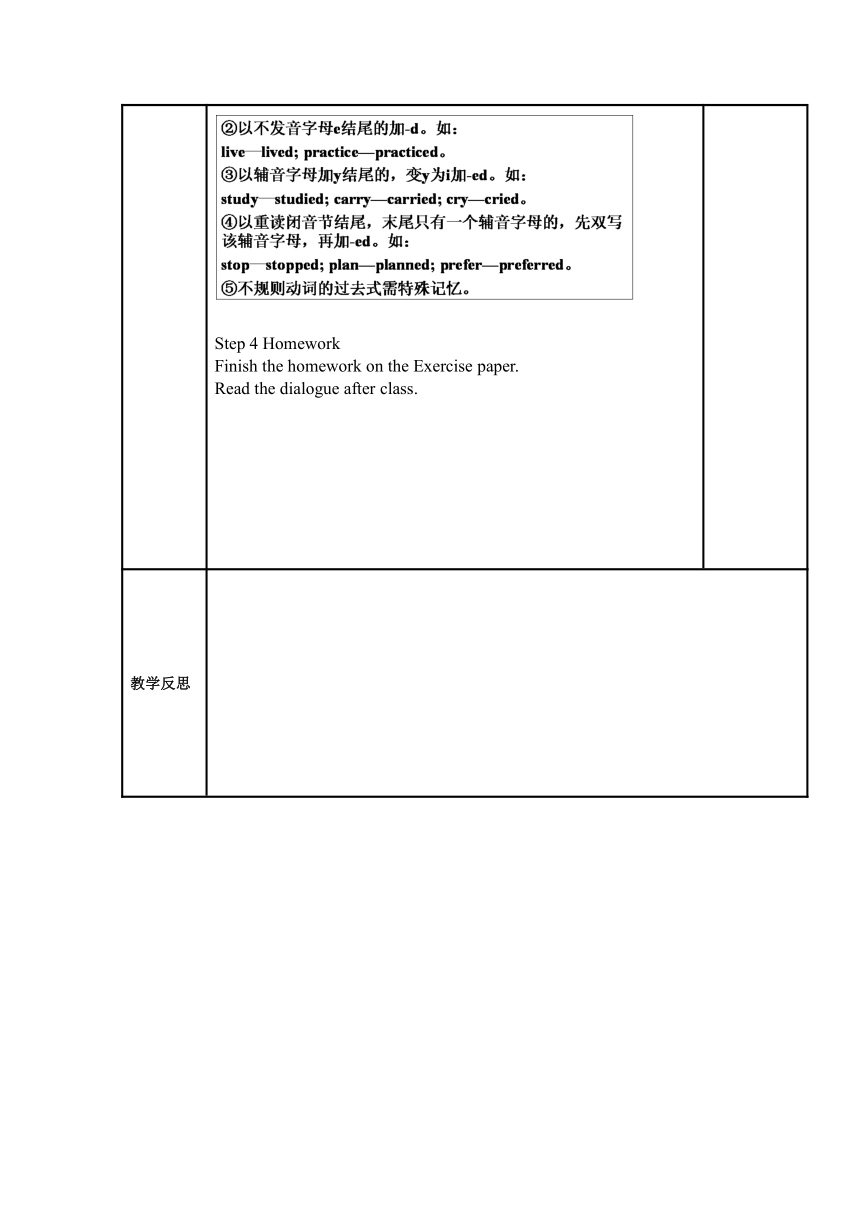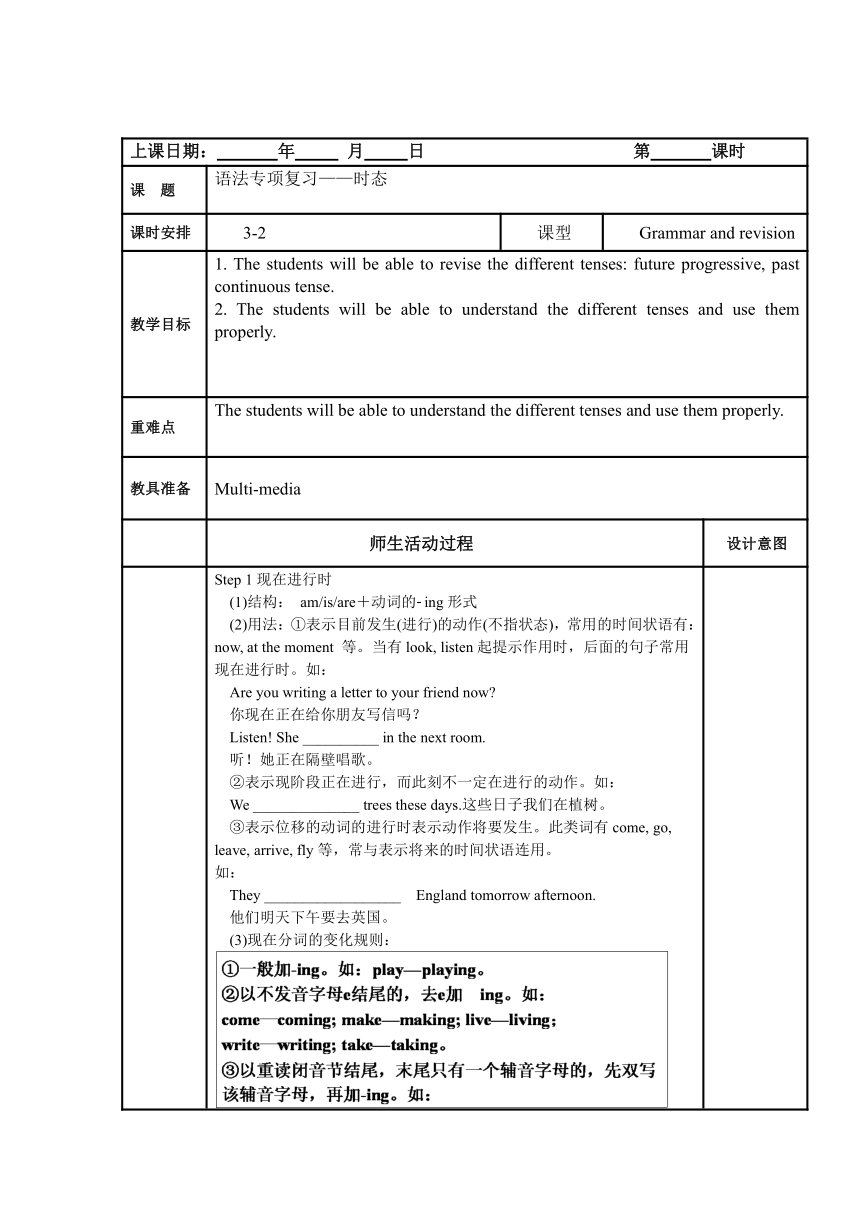语法专项复习—时态教案
图片预览




文档简介
上课日期: 年 月 日 第 课时
课 题 语法专项复习——时态
课时安排 3-1 课 型 Grammer and revision
教学目标 1. The students will be able to revise the different tenses: simple present tense, past indefinite tense. 2. The students will be able to understand the different tenses and use them properly.
重难点 1. The students will be able to understand the different tenses and use them properly.
教具准备 Multi-media
师生活动过程 设计意图
Step 1 Simple present tense (1)结构:(以work为例) (2)用法: ①表示事实、现状、性质或经常的、习惯性的动作。常与seldom, often, usually, always, sometimes, today, every day, once a week, every five minutes, on Sundays等时间状语连用。如: I go to school at seven every day. 我每天七点去上学。 ②表示普遍真理。如: The earth ______________ the sun. 地球绕着太阳转。 ③表示在现在时间里所发生的一个动作。如: Here comes the bus. 公共汽车来了。 ④在时间和条件状语从句中代表一般将来时。如: I'll go shopping with my mother if she ________ tomorrow. 如果明天我妈妈有空,我将和她去购物。 动词的第三人称单数形式变化规则如下: Step 2 Past indefinite tense 表示过去发生的动作或存在的状态。句中的谓语动词要变为过去式。 (1)句型结构: ①be动词型 I was a student last year. 去年我是一名学生。 —Were you at home this morning 今天早上你在家吗? —Yes, I was./No, I wasn't. 是的,我在。/不,我不在。 ②行为动词型 Tom ______ to Shanghai last year. 去年汤姆去了上海。 John __________ here last year. 去年约翰没有住在这里。 Did you see him just now 你刚才看见他了吗? (2)用法: ①主要表示过去的某个时间发生的动作或存在的状态。如: His friend was at work yesterday.他的朋友昨天在工作。 ②表示过去经常或反复发生的动作,常与often,always 等表示频度的时间状语连用。如: We often went to work by bus last year. 去年我们经常乘公交车上班。 ③和when 等引导的时间状语从句连用。如: When he got home, he ______ a rest. 当他到家时,他休息了一会儿。 ④常与表示过去的时间状语连用。这些状语有:ago, yesterday, last week, in the old days, when I was five years old, in 1995等。如: We began our work ______________. 三小时前,我们开始工作。 (3)动词过去式的变化规则: Step 4 Homework Finish the homework on the Exercise paper. Read the dialogue after class.
教学反思
上课日期: 年 月 日 第 课时
课 题 语法专项复习——时态
课时安排 3-2 课型 Grammar and revision
教学目标 1. The students will be able to revise the different tenses: future progressive, past continuous tense. 2. The students will be able to understand the different tenses and use them properly.
重难点 The students will be able to understand the different tenses and use them properly.
教具准备 Multi-media
师生活动过程 设计意图
Step 1现在进行时 (1)结构: am/is/are+动词的 ing形式 (2)用法:①表示目前发生(进行)的动作(不指状态),常用的时间状语有: now, at the moment 等。当有look, listen起提示作用时,后面的句子常用现在进行时。如: Are you writing a letter to your friend now 你现在正在给你朋友写信吗? Listen! She __________ in the next room. 听!她正在隔壁唱歌。 ②表示现阶段正在进行,而此刻不一定在进行的动作。如: We ______________ trees these days.这些日子我们在植树。 ③表示位移的动词的进行时表示动作将要发生。此类词有come, go, leave, arrive, fly等,常与表示将来的时间状语连用。 如: They __________________ England tomorrow afternoon. 他们明天下午要去英国。 (3)现在分词的变化规则: Step 2 过去进行时 (1)结构: was/were+doing (2)用法:过去进行时主要表示过去某一时间点或某一段时间正在进行的动作。如: His father fell down while he __________ his bicycle and hurt himself. 他爸爸骑自行车时摔到了,弄伤了自己。 (3)常用的时间状语: this morning, the whole morning, all day yesterday, from nine to ten, last evening, when, while。 (4)when和while的区别: ①引导时间状语从句时,while 连接的是时间段,后常接延续性动词;而when连接的既可以是延续性动词也可以是非延续性动词。如: What was your father doing ______ your mother was cooking?你妈妈正在做饭时,你爸爸干什么呢? What was your mother doing ______ you came back 当你回来时,你妈妈干什么呢? ②while可以连接两个并列的句子,而when不可以。如: I was trying my best to finish my work while my sister was watching TV. 我当时正在尽力完成作业,而我的妹妹正在看电视。 ③when可作特殊疑问词,对时间进行提问,while 不能。如:When were you born 你是什么时候出生的? Step 3 Homework 1. Read the passage till read it fluently. 2.Finish the exercises in Exercise paper
教学反思
上课日期: 年 月 日 第 课时
课 题 语法专项复习——时态
课时安排 3-3 课型 grammar and revision
教学目标 1. The students will be able to revise the different tenses: simple future tense. present perfect. 2. The students will be able to understand the different tenses and use them properly.
重难点 The students will be able to understand the different tenses and use them properly.
教具准备 Multi-media
师生活动过程 设计意图
Step 1 Simple future tense (1)结构:助动词shall/will+动词原形 (2)用法: ①表示将要发生的动作或状态,常用的时间状语有: later(on), soon, in a month, next time, from now on, tomorrow等。如: I shall be eighteen years old next year.明年我18岁了。 ②表示某种必然的趋势。如: Fish __________ without water.离开水,鱼就会死。 (3)注意: ① 在以第一人称作主语的问句中,常用 shall 表示提议和询问情况,在以第二人称作主语的句中,用will 表示请求。如:Where shall we have lunch 我们在哪里吃午饭? ②当主语是第一人称时,用will 表示意愿、决心、允诺、命令等。如: I will give Xiaoming a good gift for his birthday. 我会在小明生日时送他一份好礼。 ③在时间或条件状语从句中,一般用一般现在时代替一般将来时。如: I ____________ Jim when he ______ there. 当吉姆到达那里时,我将给他写信。 ④“be going to+动词原形” 也可表示将来时。 a.表示主观意愿、打算等。如: He's going to learn English next term.下学期他打算学英语。 b.根据已有迹象能推测出可能要发生的情况。如: Look at the black clouds!It __________ rain. 看那些乌云!马上要下雨了。 [提示] 表示位移的动词的进行时常表达将来之意,如: come, go, leave, fly, start, finish等。如: She's flying to Australia next month.下个月她将飞往澳大利亚。 Step 2 现在完成时 (1)结构: have/has+动词的过去分词 (过去分词变化规则基本与过去式变化相同。有些特殊变化需单独记忆) (2)用法: ①表示过去发生的动作对现在造成的影响和结果。有时与just, already, yet, recently, before,ever, never, twice, three times等时间状语连用。如: I __________ the film already. 我已经看过这部电影了。(现在我知道电影的内容了。) ②表示从过去某一时刻开始一直持续到现在的动作或状态。常与“since+时间点”,“for+时间段”,及how long, (ever)since, ever, before, so far, in the last/past few years, up to now, till now等时间状语连用。如: We've planted thousands of trees in the past few years. 过去几年我们种了成千上万棵树。 So far there __________ no bad news. 到现在为止还没有什么坏消息。 (3)一般过去时与现在完成时的区别 一般过去时只强调在过去发生过某事或关注的是动作发生的时间、地点、方式等。而现在完成时则强调过去的动作对现在的影响,因此,若不强调某事对现在的影响就不用现在完成时。如: I saw the movie yesterday. 我昨天看了这部电影。(强调电影是昨天看的) I have already seen the film. 我已经看过这部电影了。(强调到现在为止看过这部电影了) (4)延续性动词 在现在完成时中,如果有持续的时间状语,要把非延续性动词变为延续性动词。如: I have had the book for two days. 这本书我已经买了两天了。(用had,而不用bought) I have been in Tokyo for two weeks. 我已经来东京两周了。(用been in,而不用come to) 常用瞬间动词变延续性动词表 ①have arrived at/in sp, got to/reached sp, come/gone/ moved to sp→have been in sp ②have come/gone back, returned→have been back ③have come/gone out→have been out ④have become→have been ⑤have closed/opened→have been closed/open ⑥have got up→have been up ⑦have died→______________ ⑧have left sp→______________ ⑨have fallen asleep/gone to sleep→have been asleep ⑩have finished/ended/completed→___________________ have married→have been married have started/begun to do sth→have done sth have begun→______________ have borrowed→______________ have bought→have had have lost→haven't had have put on→have worn have caught/got a cold→have had a cold have got to know→have known have gone to→have been in have joined/taken part in the league/the Party/the army→have been a member of the league/the Party/the army, have been in the league/the Party/the army, have been the Party's member/the league member/the soldier Step 3 Homework Finish the exercises in Exercise paper
教学反思
课 题 语法专项复习——时态
课时安排 3-1 课 型 Grammer and revision
教学目标 1. The students will be able to revise the different tenses: simple present tense, past indefinite tense. 2. The students will be able to understand the different tenses and use them properly.
重难点 1. The students will be able to understand the different tenses and use them properly.
教具准备 Multi-media
师生活动过程 设计意图
Step 1 Simple present tense (1)结构:(以work为例) (2)用法: ①表示事实、现状、性质或经常的、习惯性的动作。常与seldom, often, usually, always, sometimes, today, every day, once a week, every five minutes, on Sundays等时间状语连用。如: I go to school at seven every day. 我每天七点去上学。 ②表示普遍真理。如: The earth ______________ the sun. 地球绕着太阳转。 ③表示在现在时间里所发生的一个动作。如: Here comes the bus. 公共汽车来了。 ④在时间和条件状语从句中代表一般将来时。如: I'll go shopping with my mother if she ________ tomorrow. 如果明天我妈妈有空,我将和她去购物。 动词的第三人称单数形式变化规则如下: Step 2 Past indefinite tense 表示过去发生的动作或存在的状态。句中的谓语动词要变为过去式。 (1)句型结构: ①be动词型 I was a student last year. 去年我是一名学生。 —Were you at home this morning 今天早上你在家吗? —Yes, I was./No, I wasn't. 是的,我在。/不,我不在。 ②行为动词型 Tom ______ to Shanghai last year. 去年汤姆去了上海。 John __________ here last year. 去年约翰没有住在这里。 Did you see him just now 你刚才看见他了吗? (2)用法: ①主要表示过去的某个时间发生的动作或存在的状态。如: His friend was at work yesterday.他的朋友昨天在工作。 ②表示过去经常或反复发生的动作,常与often,always 等表示频度的时间状语连用。如: We often went to work by bus last year. 去年我们经常乘公交车上班。 ③和when 等引导的时间状语从句连用。如: When he got home, he ______ a rest. 当他到家时,他休息了一会儿。 ④常与表示过去的时间状语连用。这些状语有:ago, yesterday, last week, in the old days, when I was five years old, in 1995等。如: We began our work ______________. 三小时前,我们开始工作。 (3)动词过去式的变化规则: Step 4 Homework Finish the homework on the Exercise paper. Read the dialogue after class.
教学反思
上课日期: 年 月 日 第 课时
课 题 语法专项复习——时态
课时安排 3-2 课型 Grammar and revision
教学目标 1. The students will be able to revise the different tenses: future progressive, past continuous tense. 2. The students will be able to understand the different tenses and use them properly.
重难点 The students will be able to understand the different tenses and use them properly.
教具准备 Multi-media
师生活动过程 设计意图
Step 1现在进行时 (1)结构: am/is/are+动词的 ing形式 (2)用法:①表示目前发生(进行)的动作(不指状态),常用的时间状语有: now, at the moment 等。当有look, listen起提示作用时,后面的句子常用现在进行时。如: Are you writing a letter to your friend now 你现在正在给你朋友写信吗? Listen! She __________ in the next room. 听!她正在隔壁唱歌。 ②表示现阶段正在进行,而此刻不一定在进行的动作。如: We ______________ trees these days.这些日子我们在植树。 ③表示位移的动词的进行时表示动作将要发生。此类词有come, go, leave, arrive, fly等,常与表示将来的时间状语连用。 如: They __________________ England tomorrow afternoon. 他们明天下午要去英国。 (3)现在分词的变化规则: Step 2 过去进行时 (1)结构: was/were+doing (2)用法:过去进行时主要表示过去某一时间点或某一段时间正在进行的动作。如: His father fell down while he __________ his bicycle and hurt himself. 他爸爸骑自行车时摔到了,弄伤了自己。 (3)常用的时间状语: this morning, the whole morning, all day yesterday, from nine to ten, last evening, when, while。 (4)when和while的区别: ①引导时间状语从句时,while 连接的是时间段,后常接延续性动词;而when连接的既可以是延续性动词也可以是非延续性动词。如: What was your father doing ______ your mother was cooking?你妈妈正在做饭时,你爸爸干什么呢? What was your mother doing ______ you came back 当你回来时,你妈妈干什么呢? ②while可以连接两个并列的句子,而when不可以。如: I was trying my best to finish my work while my sister was watching TV. 我当时正在尽力完成作业,而我的妹妹正在看电视。 ③when可作特殊疑问词,对时间进行提问,while 不能。如:When were you born 你是什么时候出生的? Step 3 Homework 1. Read the passage till read it fluently. 2.Finish the exercises in Exercise paper
教学反思
上课日期: 年 月 日 第 课时
课 题 语法专项复习——时态
课时安排 3-3 课型 grammar and revision
教学目标 1. The students will be able to revise the different tenses: simple future tense. present perfect. 2. The students will be able to understand the different tenses and use them properly.
重难点 The students will be able to understand the different tenses and use them properly.
教具准备 Multi-media
师生活动过程 设计意图
Step 1 Simple future tense (1)结构:助动词shall/will+动词原形 (2)用法: ①表示将要发生的动作或状态,常用的时间状语有: later(on), soon, in a month, next time, from now on, tomorrow等。如: I shall be eighteen years old next year.明年我18岁了。 ②表示某种必然的趋势。如: Fish __________ without water.离开水,鱼就会死。 (3)注意: ① 在以第一人称作主语的问句中,常用 shall 表示提议和询问情况,在以第二人称作主语的句中,用will 表示请求。如:Where shall we have lunch 我们在哪里吃午饭? ②当主语是第一人称时,用will 表示意愿、决心、允诺、命令等。如: I will give Xiaoming a good gift for his birthday. 我会在小明生日时送他一份好礼。 ③在时间或条件状语从句中,一般用一般现在时代替一般将来时。如: I ____________ Jim when he ______ there. 当吉姆到达那里时,我将给他写信。 ④“be going to+动词原形” 也可表示将来时。 a.表示主观意愿、打算等。如: He's going to learn English next term.下学期他打算学英语。 b.根据已有迹象能推测出可能要发生的情况。如: Look at the black clouds!It __________ rain. 看那些乌云!马上要下雨了。 [提示] 表示位移的动词的进行时常表达将来之意,如: come, go, leave, fly, start, finish等。如: She's flying to Australia next month.下个月她将飞往澳大利亚。 Step 2 现在完成时 (1)结构: have/has+动词的过去分词 (过去分词变化规则基本与过去式变化相同。有些特殊变化需单独记忆) (2)用法: ①表示过去发生的动作对现在造成的影响和结果。有时与just, already, yet, recently, before,ever, never, twice, three times等时间状语连用。如: I __________ the film already. 我已经看过这部电影了。(现在我知道电影的内容了。) ②表示从过去某一时刻开始一直持续到现在的动作或状态。常与“since+时间点”,“for+时间段”,及how long, (ever)since, ever, before, so far, in the last/past few years, up to now, till now等时间状语连用。如: We've planted thousands of trees in the past few years. 过去几年我们种了成千上万棵树。 So far there __________ no bad news. 到现在为止还没有什么坏消息。 (3)一般过去时与现在完成时的区别 一般过去时只强调在过去发生过某事或关注的是动作发生的时间、地点、方式等。而现在完成时则强调过去的动作对现在的影响,因此,若不强调某事对现在的影响就不用现在完成时。如: I saw the movie yesterday. 我昨天看了这部电影。(强调电影是昨天看的) I have already seen the film. 我已经看过这部电影了。(强调到现在为止看过这部电影了) (4)延续性动词 在现在完成时中,如果有持续的时间状语,要把非延续性动词变为延续性动词。如: I have had the book for two days. 这本书我已经买了两天了。(用had,而不用bought) I have been in Tokyo for two weeks. 我已经来东京两周了。(用been in,而不用come to) 常用瞬间动词变延续性动词表 ①have arrived at/in sp, got to/reached sp, come/gone/ moved to sp→have been in sp ②have come/gone back, returned→have been back ③have come/gone out→have been out ④have become→have been ⑤have closed/opened→have been closed/open ⑥have got up→have been up ⑦have died→______________ ⑧have left sp→______________ ⑨have fallen asleep/gone to sleep→have been asleep ⑩have finished/ended/completed→___________________ have married→have been married have started/begun to do sth→have done sth have begun→______________ have borrowed→______________ have bought→have had have lost→haven't had have put on→have worn have caught/got a cold→have had a cold have got to know→have known have gone to→have been in have joined/taken part in the league/the Party/the army→have been a member of the league/the Party/the army, have been in the league/the Party/the army, have been the Party's member/the league member/the soldier Step 3 Homework Finish the exercises in Exercise paper
教学反思
同课章节目录
- Module 1 Wonders of the world
- Unit 1 It's more than 2,000 years old.
- Unit 2 The Grand Canyon was not just big.
- Unit 3 Language in use
- Module 2 Public holidays
- Unit 1 My family always go somewhere interesting a
- Unit 2 We have celebrated the festival since the f
- Unit 3 Language in use
- Module 3 Heroes
- Unit 1 She trained hard,so she became a great play
- Unit 2There were few doctors, so he had to work ve
- Unit 3 Language in use
- Module 4 Home alone
- Unit 1 I can look after myself, although it won’t
- Unit 2 I became so bored with their orders that I
- Unit 3 Language in use
- Module 5 Museums
- Unit 1 Don't cross that rope!
- Unit 2 If you ever go to London, make sure you vis
- Unit 3 Language in use
- Module 6 Problems
- Unit 1 If I start after dinner, I'll finish it be
- Unit 2 If you tell him the truth now, you will sho
- Unit 3 Language in use
- Revision Module A
- Module 7 Great books
- Unit 1 We're still influenced by Confucius's idea
- Unit 2 It is still read and loved.
- Unit 3 Language in use
- Module 8 Sports life
- Unit 1 Daming wasn't chosen for the team last time
- Unit 2 He was invited to competitions around the w
- Unit 3 Language in use
- Module 9 Great inventions
- Unit 1 Will computers be used more than books in t
- Unit 2 Will books be replaced by the Internet?
- Unit 3 Language in use
- Module 10 Australia
- Unit 1 I have some photos that I took in Australia
- Unit 2 The game that they like most is Australian
- Unit 3 Language in use
- Module 11 Photos
- Unit 1 He's the boy who won the photo competition
- Unit 2 The photo which we liked best was taken by
- Unit 3 Language in use
- Module 12 Save our world
- Unit 1 If everyone starts to do something, the wor
- Unit 2 Repeat these three words daily: reduce, reu
- Unit 3 Language in use
- Revision Module B
